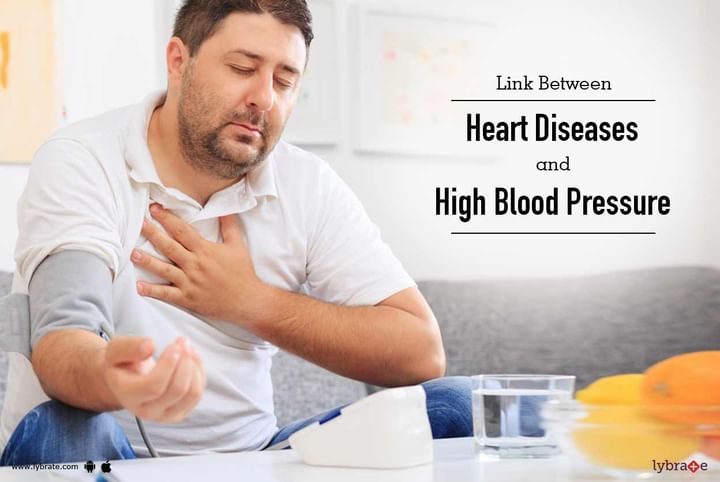Link Between Heart Diseases and High Blood Pressure
Blood pressure is the measure of the resistance to the natural flow of blood in the blood vessels. The major, minor and few smaller blood vessels themselves have a thin muscular lining that keeps the vessel supple and aids the flow of nutritious blood within its tube-like structure. The vessel walls resist the free flow causing a reverse pressure that is referred to as Blood Pressure. This pressure strains the heart muscles (Left Ventricle more) to contract strongly to push the nutritious blood into the body circulation system.
Due to numerous factors, there is an increase of resistance within the blood vessels that leads to an increase in blood pressure. At a later stage, this results in lack of adequate blood flow to the end tissues and an accumulation of fluids in the various tissues/organs and a mismanagement of the nutrition-detoxification rhythmic cycle of the body. This takes a long time to develop and unless the last stage hampers body functions, it is not detected. Hence, blood pressure is known as a silent disease.
Systolic and diastolic are the two rhythms corresponding to the expansion and contraction of the heart chambers during pumping of blood into the body. This rhythm creates two distinct pressures within the blood vessels. Systolic is when the heart ventricular chamber contract to pump blood into the body, so the pressure is higher. This indicated the force or strain on the heart to push blood into the circulatory system. Hence, this count is considered significant in evaluating health parameters.
High BP as a disease is declared when three or more readings taken at different times of a day or on consecutive days shows increase in BP. Higher the BP, more strain is exerted by the heart. Since the heart is essentially a muscular organ, the muscles of the heart get affected. Sometimes, the heart muscles increase in mass and size making the heart chambers smaller in volume. This further deteriorates the circulation capability leading to numerous diseases. The strain of pumping nutrition to different body organs is also felt by the heart itself. Lack of nutrition can lead to death of cardiac tissue leading to heart failure. High blood pressure makes the heart walls thicken and becomes stiffer which makes it even more difficult to pump blood. Thickening of the heart muscles is also known as left ventricular hypertrophy and cause heart failure.
A systolic blood pressure reading that is higher than 140 mm Hg or a diastolic blood pressure higher than 90 mm Hg characterizes by high blood pressure. High blood pressure is said to be responsible for 50% of the recorded cases of ischemic strokes and also increases the risk of hemorrhagic strokes.
When heart cannot pump with enough force, there is a mismanagement in the intra-cellular and tissue fluid restoration. This puts a great strain on the kidney function. In due course of time, numerous organs of the body suffer and depending on the body constitution, immunity for rejuvenation and restoration of order, the person suffer from numerous diseases.
Diabetes worsens the situation of BP and adds to the deterioration of heart health, blood vessel health. Poor heart functioning leads to different symptoms like:
- Shortness of breath
- Swollen ankles or feet
- Difficulty lying flat on your back
- Bloating and nausea
- Irregular pulse
- Frequent urge to urinate at night
- Fatigue
Due to disturbances in BP and other factors leading to lacking of nutrition to the heart tissue. Heart Disease complications are commonly seen with symptoms as follows:
Radiating or dull pain, especially in the chest, radiating in the arms, especially left arm, neck, back and in the stomach especially in women.
- Shortness of breath; change in breathing patterns and heaviness in chest
- Dizziness and fainting sometimes
- Irregular pulse and palpitations
- Sudden onset of excessive sweating
- Unexplained fatigue, weakness and depression
Heart Disease can be treated with natural ayurvedic medicaments successfully in more than 80% of patients. Numerous ayurvedic medicines have been clinically evaluated to show positive changes supported with clinical investigation. Since ayurvedic medicines are targeted to reaching the root cause of the disturbances and to reduce the burden of the disease they go beyond the relief of symptoms.
Natural Ayurvedic medicines also participate in the rejuvenation of the heart muscles, the blood vessels, the detoxification of the body and re-balancing of health parameters, Ayurvedic treatment options are gaining great relevance and patient opt for such treatment in greater numbers from all over the world. These treatments are non-invasive and very cost effective. They are good to be taken from prevention to after angioplasty, stent or bye-pass to treat the cause of disease.
Ayurveda is a health science that takes into consideration lifestyle modifications, adequate detoxification, re-balancing body element and strengthening the system from all aspects. Ayurvedic medicines have proved useful in the treatment of Blood Pressure, Diabetes, Vascular disease (leading to atherosclerosis, blockages, wear-tear of blood vessels) and Heart disease. Today, these treatment options are gaining importance and acceptance in our society. If you wish to discuss about any specific problem, you can consult an ayurveda and ask a free question.



+1.svg)
